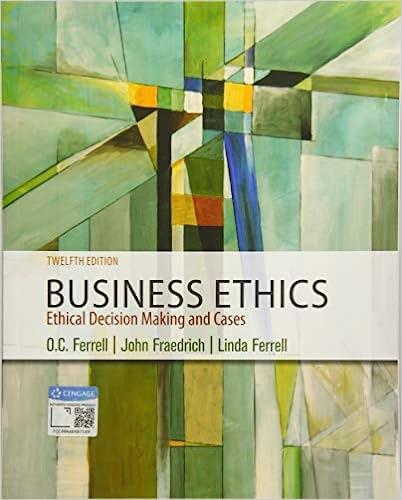One year out of the Pennsylvania university system, Randy was hired by Meeker, a medical warehouse that
Question:
One year out of the Pennsylvania university system, Randy was hired by Meeker, a medical warehouse that provides pharmaceutical products to various hospitals and clinics within a three-state area. Meeker was the dominant company in the market. Equipped with his BS degree, Randy was eager to learn, get ahead, and begin his career. As a new employee, he was required to go through extensive training to learn about hospital and clinic regulations, laws, various system procedures, and software applications. The two-month training included descriptions of the usual type of emergencies experienced in clinics and hospitals and what the needs were concerning equipment and supplies. He learned how to use various products and equipment and to train others in these areas. Part of his training was working in all areas of the medical warehouse.
One day Randy’s supervisor, Cheryl, brought him into her office to discuss his next assignment. She explained to him that several of the hospitals they serve were about to begin their annual inventory counts. When these inventory counts occur, a representative from Meeker must go into the hospitals and replace all expired supplies and equipment with new ones.
“One of the problems we’ve been having is the expiration dates on the products we supply are shorter than those of our competitors,” Cheryl explained. “To keep our clients loyal, we offer a credit to our clients when we take back the expired products. Unfortunately, that’s caused us to lose profits.”
Cheryl paused for a moment, then continued. “We can’t keep losing profits like this, so I’ve developed an idea for cutting costs and increasing our competitive advantage.”
Cheryl handed several sheets of sticky labels to Randy.
He looked them over and found they were exact replicas of the labels on their medical products for over-the-counter medications. The expiration dates on these labels were three months from the current date. Randy looked at Cheryl for more of an explanation.
Cheryl turned to Randy and told him to replace the old labels with the new ones and leave the inventory in the hospitals. Randy began to get uncomfortable. “But Cheryl, couldn’t this be dangerous if the hospital uses expired products?”
Cheryl shook her head. “You don’t have to worry. Our competitors offer similar products with a longer expiration date, and there’s really no harm in using these products after their expiration date. They are just a little less potent, but not more harmful in any way.”
Randy took the labels and headed to the hospitals.
As he drove, he went over the instructions in his head.
Something about this made him feel uneasy, but he also understood there was no harm in changing the labels.
In fact, there were times he remembered taking expired over-the-counter medication himself and it didn’t hurt him in any way. Additionally, he would only be extending the date by three months, which is not a long time for medications.
On the other hand, he recalled a moment from his training when he was cautioned about expired medical products. Thinking back, Randy only recalled being cautioned against using expired prescription medications, not anything about over-the-counter medications. Randy also wondered if he would be questioned by the hospital administration staff when he asked for their signature on the inventory paperwork. He knew they would find it odd if there were no credits to their account for expired medications. How would he explain the “new policy” to them without being dishonest?
Questions:-
1. How should Randy deal with the dilemma he is facing?
2. What are the implications of comparing Meeker’s practices with those of its competitors?
3. What kind of responsibility does Randy have to the different stakeholders involved in this situation? Does his responsibility to Meeker differ from his responsibility to the hospitals?
Step by Step Answer:

Business Ethics Ethical Decision Making And Cases
ISBN: 9781337614436
12th Edition
Authors: O. C. Ferrell, John Fraedrich, Linda Ferrell





